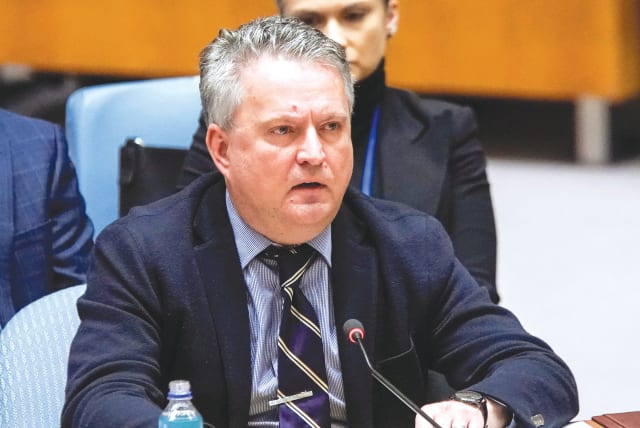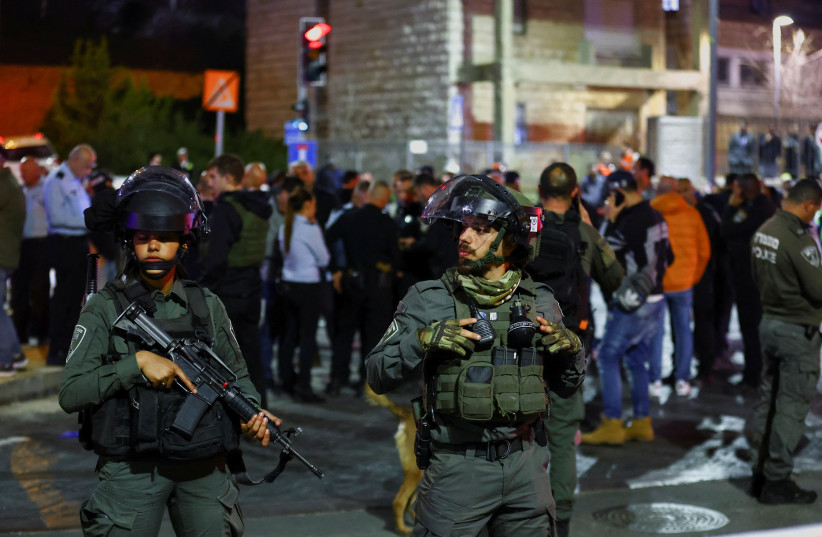Ukraine should back Israel for fighting Iran-backed Palestinian terror - opinion

Russia uses Iranian-made drones in Ukraine. Iran also backs Palestinian terror attacks against Israel, including killing Ukrainians. When Israel fights Palestinian terror, it defends Ukraine.
Russia’s use of Iranian-supplied kamikaze drones against Ukraine is, by now, notorious. Less known is the complicity of the Islamic Republic in the murder of Ukrainian citizens 2,000 km. away in Israel.
Of the 40 people killed by the surging Palestinian terrorist attacks of the past year, three – almost one in 10 – were Ukrainian.
Irina Korolova was milling with worshipers outside a synagogue in Jerusalem’s Neveh Ya’acov neighborhood on a Friday evening last month when she was shot dead along with six Israelis by a pistol-wielding Arab from the east of the capital. According to local media reports, the 60-year-old Ukrainian was working as a caregiver in Israel.
On March 29, 2022, Dmitri Mitrik, 24, and Victor Sorokopot, 32, were outside a grocery store in Bnei Brak, relaxing after their jobs in construction, when an infiltrator from the West Bank gunned them down with an M-16. He went on to kill two Israeli civilians and a police officer.
Palestinians were the killers, but Iran put their fingers on the triggers
The murderers were Palestinian but Tehran helped put their fingers on the triggers. The Islamic Republic is the main foreign sponsor of Palestinian terrorist groups Hamas and Islamic Jihad, and has a hand in the influx of smuggled firearms into Israel, including into the West Bank.
After the 11-day conflict between Israel and Hamas in May 2021, the terrorist group thanked Iran for providing it with money, weapons and technology. In 2020, the United States government reported that Iran provides a combined total of $100 million (NIS 354 m.) annually to Palestinian terrorist groups, including Hamas and Islamic Jihad. In 2019, the US sanctioned Hamas-linked financial operatives for funneling tens of millions of dollars to Hamas from the regime in Iran for terrorist attacks originating from the Gaza Strip.
After Palestinian terrorists murdered and maimed scores of Americans, including 29-year-old US Army veteran Taylor Force, in 2016, the US moved to exact a price in damages awarded in court against Palestinian entities and legislation, such as the Taylor Force Act. The 2018 law, designed to stop pay for slay, prohibits US economic assistance to the Palestinian Authority unless it terminates its longstanding practice of providing lifetime support to the families of terrorists who have targeted Americans and Israelis.
While it fights against the brutal Russian onslaught, Ukraine should similarly rise to the defense of its citizens abroad, even as it strives to protect them at home.
WHILE IT may be too preoccupied with wartime struggles to prosecute individual cases, Kyiv should go beyond its condemnation of the recent Palestinian terror attacks to a fuller review of policy on the Israeli-Palestinian conflict.
A line should be drawn under Ukraine’s past pattern of voting against Israel in United Nations resolutions advanced by the Palestinians. Ukraine has voted against Israel 105 times, or 79% of total Israel-related resolutions, since 2015.
For example, in November, a UN panel with Ukraine’s support passed a resolution denying Israeli claims to Jerusalem and calling on the International Court of Justice to offer an opinion on the legitimacy of Israel’s presence in the West Bank. When the UN General Assembly passed the resolution weeks later, Ukraine did not cast a vote, a half-hearted effort to repair ties with Israel without angering the UN majority that backed the measure.
Yet in their common struggle against dictatorships and their terrorist proxies, Ukraine and Israel have shared interests and values. They also have shared ethnic links with tens of thousands of Ukrainians living in Israel and hundreds of thousands of Jews living in Ukraine, including Ukrainian President Volodymyr Zelensky.
And even as Kyiv understandably appeals for more help in the war, it should be mindful of the fact that Israel is busy fighting its own war – on the streets, against Tehran-backed terrorists targeting its civilians. So far, Israel has rejected Ukrainian requests to supply military aid, concerned that such weaponry could fall into Russian hands, divert those systems needed for Israel’s defense and spur Moscow to deny Israel the ability to target Iranian assets in Syria. Russia has again warned Israel about providing arms to Ukraine saying that anyone providing weapons will be considered legitimate targets for Russian armed forces.
This Russian threat was in response to a statement this week from Prime Minister Benjamin Netanyahu that he is considering providing military support to Kyiv. But Israel has already taken steps to support Ukraine in other ways. It has taken in thousands of Ukrainian war refugees, struck at the Iranian ability to arm Russian President Vladimir Putin with drones and missiles, provided Ukraine with valuable intelligence, and sent Ukraine armored ambulances and other humanitarian aid.
When Israel fights back against Iran and Iran-backed Palestinian terrorism, it is acting in Ukraine’s defense, as well. Kyiv needs to recognize that, publicly and unequivocally. It may also help strengthen the case for Israeli military support, as well.
The writer is the chief executive of the Foundation for Defense of Democracies. He was sanctioned by Iran in 2019 and Russia in 2022. Follow him on Twitter @mdubowitz.
Jerusalem Post Store
`; document.getElementById("linkPremium").innerHTML = cont; var divWithLink = document.getElementById("premium-link"); if (divWithLink !== null && divWithLink !== 'undefined') { divWithLink.style.border = "solid 1px #cb0f3e"; divWithLink.style.textAlign = "center"; divWithLink.style.marginBottom = "15px"; divWithLink.style.marginTop = "15px"; divWithLink.style.width = "100%"; divWithLink.style.backgroundColor = "#122952"; divWithLink.style.color = "#ffffff"; divWithLink.style.lineHeight = "1.5"; } } (function (v, i) { });

